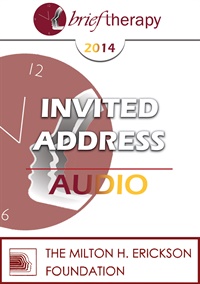
- Average Rating:
- Not yet rated
- Topic Areas:
- Invited Addresses | Brief Therapy | Therapist Development | Training
- Categories:
- Brief Therapy Conference | Brief Therapy Conference 2014
- Faculty:
- Jeffrey Zeig, PhD
- Duration:
- 1:01:08
- Format:
- Audio Only
- Original Program Date:
- Dec 14, 2014
- Short Description:
- Skills and experience, research and theory—each plays a critical role in the development of effective therapy practice. And then there is something else. When we recall the work of such figures as Milton Erickson, Virginia Satir, Carl Rogers and Carl Whitaker, we detect another layer: artistry. Surprisingly, artistry is something that can be taught, or more accurately, expanded or enhanced. Everyone has the capacity.
- Price:
- $15.00 - Base Price
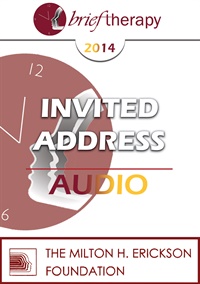
- Average Rating:
- Not yet rated
- Topic Areas:
- Anxiety | Invited Addresses | Brief Therapy | Children and Adolescent Therapy | Homework
- Categories:
- Brief Therapy Conference | Brief Therapy Conference 2014
- Faculty:
- Lynn Lyons, LICSW
- Duration:
- 1:01:55
- Format:
- Audio Only
- Original Program Date:
- Dec 14, 2014
- Short Description:
- When working with anxious kids, your brilliance in the office means nothing if they cannot take what you offer and use it in their world. This presentation will give you eight homework assignments to engage kids from the start, and will spark your strategic creativity as you develop your own homework ideas.
- Price:
- $15.00 - Base Price
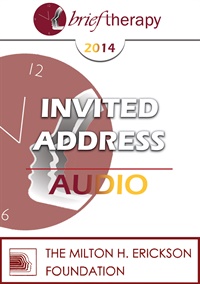
- Average Rating:
- Not yet rated
- Topic Areas:
- Anxiety | Invited Addresses | Brief Therapy | Strategic Therapy
- Categories:
- Brief Therapy Conference | Brief Therapy Conference 2014
- Faculty:
- Reid Wilson, PhD
- Duration:
- 55:39
- Format:
- Audio Only
- Original Program Date:
- Dec 14, 2014
- Short Description:
- The cutting-edge anxiety treatment is now pushing further into the confrontational. You will learn how to help clients purposely to seek out anxiety as their ticket to freedom from crippling fear. Practical methods enable clients to ignore the content of their obsessive worries and to explore the feeling of uncertainty rather than fleeing from it.
- Price:
- $15.00 - Base Price
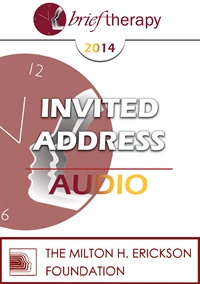
- Average Rating:
- Not yet rated
- Topic Areas:
- Depression | Hypnosis | Invited Addresses | Experiential Therapy | Neuroscience | Brief Therapy
- Categories:
- Brief Therapy Conference | Brief Therapy Conference 2014
- Faculty:
- Michael Yapko, PhD
- Duration:
- 1:08:02
- Format:
- Audio Only
- Original Program Date:
- Dec 14, 2014
- Short Description:
- How a clinician thinks about the nature of depression and answers fundamental questions - such as what causes depression - naturally determine what treatment approach he or she is most likely to take. Regardless of one’s preferred orientation, however, depression experts agree that treatment needs to be multi-dimensional and active. Furthermore, the more we learn about the neuroscience of depression, especially neuroplasticity and neurogenesis, the more important well designed experiential learning processes become in treatment.
- Price:
- $15.00 - Base Price
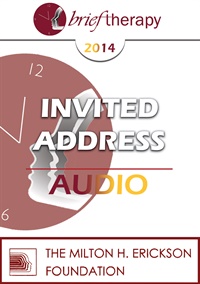
- Average Rating:
- Not yet rated
- Topic Areas:
- Invited Addresses | Brief Therapy | Generative Psychotherapy | Psychotherapy
- Categories:
- Brief Therapy Conference | Brief Therapy Conference 2014
- Faculty:
- Stephen Gilligan, PhD
- Duration:
- 1:02:32
- Format:
- Audio Only
- Original Program Date:
- Dec 14, 2014
- Short Description:
- Generative psychotherapy is an exploration of how individuals can forge positive, therapeutic responses to life challenges. This invited address concentrates on the three core connections that allow clients to do this: (1) Positive intention and goals (What do you most want to create in your life?); (2) Somatic Centering (Where do you feel the deepest resonance in your body?); and (3) Field Resources (What can most deeply support your path of change?).
- Price:
- $15.00 - Base Price
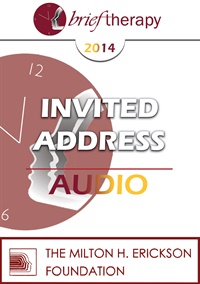
- Average Rating:
- Not yet rated
- Topic Areas:
- Post-Traumatic Stress Disorder (PTSD) | Invited Addresses | Memory | Brief Therapy
- Categories:
- Brief Therapy Conference | Brief Therapy Conference 2014
- Faculty:
- Steve Andreas, MA, NLP
- Duration:
- 59:20
- Format:
- Audio Only
- Original Program Date:
- Dec 14, 2014
- Short Description:
- The phobic core of PTSD is a conditioned response to a terrifying event, easily treated with a process demonstrated in an 8-minute video. Learn the key components that combine to make this method so effective. Other co-occurring problems—grief, rage, anxiety, guilt, shame, drugs, etc.—require different processes for resolution.
- Price:
- $15.00 - Base Price
Tags: Brief Therapy Memory PTSD
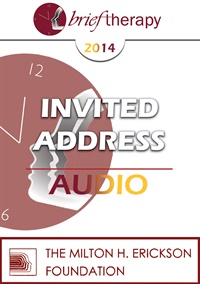
- Average Rating:
- Not yet rated
- Topic Areas:
- Post-Traumatic Stress Disorder (PTSD) | Meditation, Spirituality and Yoga | Invited Addresses | Trauma | Mind-Body
- Categories:
- Brief Therapy Conference | Brief Therapy Conference 2014
- Faculty:
- Bessel van der Kolk, MD
- Duration:
- 1:00:58
- Format:
- Audio Only
- Original Program Date:
- Dec 14, 2014
- Short Description:
- Chronic trauma interferes with self-perception and self-regulation. We will discuss effective approaches.
- Price:
- $15.00 - Base Price
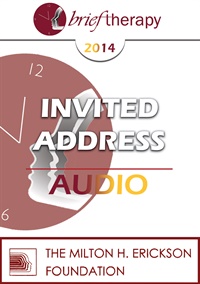
- Average Rating:
- Not yet rated
- Topic Areas:
- Consciousness | Invited Addresses | Neuroscience
- Categories:
- Brief Therapy Conference | Brief Therapy Conference 2014
- Faculty:
- Ernest Rossi, PhD
- Duration:
- 56:51
- Format:
- Audio Only
- Original Program Date:
- Dec 14, 2014
- Short Description:
- Current research in psychosocial genomics is reviewed to underpin a new evolutionary RNA/DNA epigenomic theory of the quantum transformations of consciousness and creative cognition. The alternating classical-to-quantum and quantum-to-classical transitions on all levels from mind to gene are explored for developing an understanding of how the 4-stage creative process operates in an evolving cosmos/consciousness field theory.
- Price:
- $15.00 - Base Price
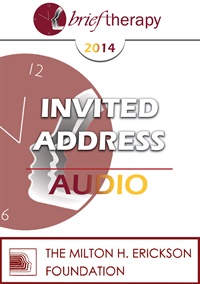
- Average Rating:
- Not yet rated
- Topic Areas:
- Happiness | Invited Addresses | Mindfulness | Brief Therapy | Buddhism
- Categories:
- Brief Therapy Conference | Brief Therapy Conference 2014
- Faculty:
- Ronald Siegel, PsyD
- Duration:
- 1:00:54
- Format:
- Audio Only
- Original Program Date:
- Dec 14, 2014
- Short Description:
- Everyone wants to be happy. While clinicians and researchers traditionally focused on helping troubled people feel less distressed—moving from -5 to 0 on the happiness scale—more recently they’ve branched out to investigate what actually leads to enhanced well-being. Some research findings point in surprising new directions, while others echo advice heard from wise elders and religious teachers across cultures and centuries.
- Price:
- $15.00 - Base Price
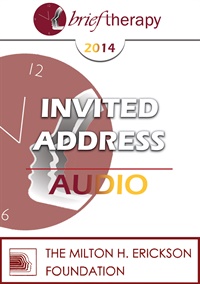
- Average Rating:
- Not yet rated
- Topic Areas:
- Invited Addresses | Brief Therapy | Future Oriented
- Categories:
- Brief Therapy Conference | Brief Therapy Conference 2014
- Faculty:
- Bill O'Hanlon, MS
- Duration:
- 1:04:06
- Format:
- Audio Only
- Original Program Date:
- Dec 14, 2014
- Short Description:
- Most therapy orients to the past. This session will offer an alternative, using "future pull," a method of engaging people in compelling preferred futures and working backwards to the near future to create change in brief therapy.
- Price:
- $15.00 - Base Price
Tags: Future Oriented Brief Therapy

- Average Rating:
- Not yet rated
- Topic Areas:
- Invited Addresses | Relationships | Brief Therapy | Couples Therapy
- Categories:
- Brief Therapy Conference | Brief Therapy Conference 2014
- Faculty:
- Pat Love, EdD
- Duration:
- 56:15
- Format:
- Audio Only
- Original Program Date:
- Dec 14, 2014
- Short Description:
- Relationships have changed since the dawn of the 21st century. Dating, mating, single life, sex-life, monogamy, matrimony, cohabitation, co-operation—all look different than a generation ago. As if it weren't challenging enough to keep up with pathological, technological, ethnic, educational, gender, geographic, socioeconomic, and sexual diversity, we now have the largest generational gap in modern history to contend with which means the relationship expectations and mores that made total sense to the Boomers now baffle many Millennials.
- Price:
- $15.00 - Base Price
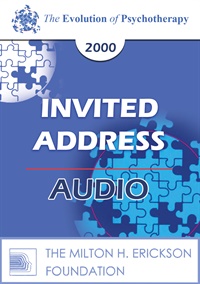
- Average Rating:
- Not yet rated
- Topic Areas:
- Invited Addresses | Social Issues | Psychotherapy | Therapist Development | Milton Erickson | Brief Therapy | Directive Therapy | History of Psychotherapy
- Categories:
- Evolution of Psychotherapy | Evolution of Psychotherapy 2000 | Pioneers in Couples and Family Therapy
- Faculty:
- Jay Haley, MA | Otto Kernberg, MD
- Duration:
- 1 Hour 16 Minutes
- Format:
- Audio Only
- Original Program Date:
- May 29, 2000
- Short Description:
- This address traces key shifts in psychotherapy, from the rise of family and brief therapy to evolving views on the unconscious and client privacy. It addresses the tension between therapy as science versus art and considers its role in settings like corrections and foster care. The importance of ethical standards and clearly defining psychotherapy is emphasized. Afterwards there is a discussion, including Otto Kernberg offering commentary on what he calls Haley's oversimplification of therapy history.
- Price:
- $15.00 - Base Price
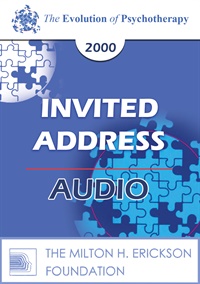
- Average Rating:
- Not yet rated
- Topic Areas:
- Invited Addresses | Therapist Development | Psychotherapy
- Categories:
- Evolution of Psychotherapy | Evolution of Psychotherapy 2000
- Faculty:
- Jeffrey Zeig, PhD | Erving Polster, PhD
- Duration:
- 1 Hour 27 Minutes
- Format:
- Audio Only
- Original Program Date:
- May 29, 2000
- Short Description:
- Therapy promotes "movement." To facilitate movement the therapist can assume therapeutic "postures." These postures are a font from which interventions follow.
- Price:
- $15.00 - Base Price
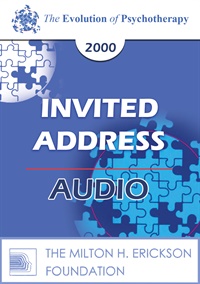
- Average Rating:
- Not yet rated
- Topic Areas:
- Invited Addresses | Existential Therapy | Psychotherapy
- Categories:
- Evolution of Psychotherapy | Evolution of Psychotherapy 2000 | Pioneers in Couples and Family Therapy
- Faculty:
- Irvin Yalom, PhD | Cloe Madanes, HDL, LIC
- Duration:
- 1 Hour 28 Minutes
- Format:
- Audio Only
- Original Program Date:
- May 29, 2000
- Short Description:
- Dr. Yalom will discuss the definition of existential psychotherapy, its sources, basic tenets and applications in clinical work. Major focus will be on the ultimate concerns of death, meaninglessness, freedom and isolation. Dr. Yalom will discuss his approach to teaching about this field through a literary conveyance.
- Price:
- $15.00 - Base Price
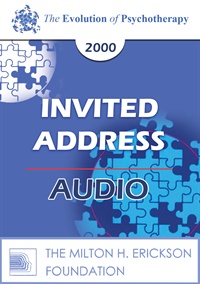
- Average Rating:
- Not yet rated
- Topic Areas:
- Invited Addresses | Psychotherapy | Reframing | Strategic Therapy | Systems Theory | Communication | Constructive Narrative | Resistance | Paradox
- Categories:
- Evolution of Psychotherapy | Evolution of Psychotherapy 2000 | Pioneers in Couples and Family Therapy
- Faculty:
- Paul Watzlawick, PhD | Zerka Moreno
- Duration:
- 1 Hour 26 Minutes
- Format:
- Audio Only
- Original Program Date:
- May 29, 2000
- Short Description:
- Watzlawick explores the “therapy of as if,” showing how behaving as if change is possible can shift a client’s reality. Drawing from philosophy, hypnotherapy, and paradox, he illustrates how small interventions—like self-fulfilling prophecies or shared metaphors—can break unhelpful cycles. Zerka Moreno adds insights from action-based methods, including role reversal and sociodrama, to deepen perspective and foster movement.
- Price:
- $15.00 - Base Price
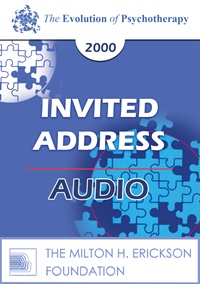
- Average Rating:
- Not yet rated
- Topic Areas:
- Psychotherapy | Invited Addresses | Narcissism | Personality Disorders | Psychoanalysis | Object Relations Theory
- Categories:
- Evolution of Psychotherapy | Evolution of Psychotherapy 2000
- Faculty:
- James F. Masterson, MD | James Hillman, PhD
- Duration:
- 1 Hour 19 Minutes
- Format:
- Audio Only
- Original Program Date:
- May 29, 2000
- Short Description:
- In this paper, Dr. Masterson gives an understanding of the intrapsychic structure of Narcissistic Personality Disorder and how it finds clinical expression through the disorders of the self triad. Clinical cases are presented to illustrate how the therapeutic intervention of mirroring interpretation of narcissistic vulnerability helps the patient to convert transference acting-out to therapeutic alliance and transference, thereby creating the condition for psychoanalytic psychotherapy.
- Price:
- $15.00 - Base Price
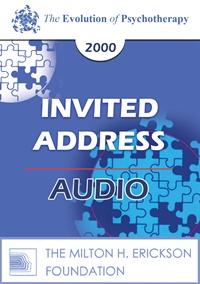
- Average Rating:
- Not yet rated
- Topic Areas:
- Invited Addresses | Psychotherapy | History of Psychotherapy | Psychoanalysis
- Categories:
- Evolution of Psychotherapy | Evolution of Psychotherapy 2000
- Faculty:
- Judd Marmor | James Bugental, PhD
- Duration:
- 1 Hour 28 Minutes
- Format:
- Audio Only
- Original Program Date:
- May 29, 2000
- Short Description:
- This address is a review of the significant theoretical and practical changes in the practice of psychoanalytically-oriented psychotherapy in the experience of the author's personal practice over the past 62 years.
- Price:
- $15.00 - Base Price
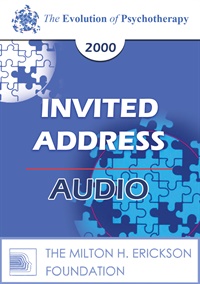
- Average Rating:
- Not yet rated
- Topic Areas:
- Psychotherapy | Invited Addresses | Law & Ethics | Transference Focused Psychotherapy (TFP)
- Categories:
- Evolution of Psychotherapy | Evolution of Psychotherapy 2000
- Faculty:
- Arnold Lazarus, Ph.D. | Michael White, B.A.S.W.
- Duration:
- 1 Hour 27 Minutes
- Format:
- Audio Only
- Original Program Date:
- May 25, 2000
- Short Description:
- This presentation will summarize the strategy, tactics and techniques of TFP (Transference Focused Psychotherapy), its indications and contraindications, process and outcome studies of the Cornell University Personality Disorders Institute that developed this treatment over the past 15 years.
- Price:
- $15.00 - Base Price
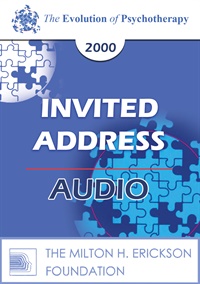
- Average Rating:
- Not yet rated
- Topic Areas:
- Psychotherapy | Invited Addresses | Therapist Development
- Categories:
- Evolution of Psychotherapy | Evolution of Psychotherapy 2000 | Pioneers in Couples and Family Therapy
- Faculty:
- Donald Meichenbaum, PhD | Jay Haley, MA
- Duration:
- 1 Hour 31 Minutes
- Format:
- Audio Only
- Original Program Date:
- May 25, 2000
- Short Description:
- Based on a review of the psychotherapy literature, seven core tasks that psychotherapists need to include and five additional core tasks of psychotherapy for patients with a history of victimization have been identified. A case conceptualization model and treatment guidelines on how to become a more effective psychotherapist will be offered.
- Price:
- $15.00 - Base Price

- Average Rating:
- Not yet rated
- Topic Areas:
- Invited Addresses | Gestalt | Psychotherapy
- Categories:
- Evolution of Psychotherapy | Evolution of Psychotherapy 2000 | Pioneers in Couples and Family Therapy
- Faculty:
- Miriam Polster | Paul Watzlawick, PhD
- Duration:
- 1 Hour 21 Minutes
- Format:
- Audio Only
- Original Program Date:
- May 25, 2000
- Short Description:
- This address will focus on some of the particulars of therapeutic attention. It will explore how to translate therapy into an increased sense of self-support and choice.
- Price:
- $15.00 - Base Price
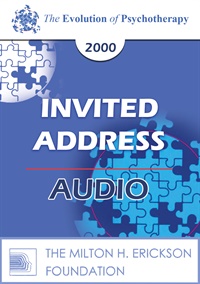
- Average Rating:
- Not yet rated
- Topic Areas:
- Invited Addresses | Psychotherapy | Relationships
- Categories:
- Evolution of Psychotherapy | Evolution of Psychotherapy 2000
- Faculty:
- Erving Polster, PhD | Judd Marmor
- Duration:
- 1 Hour 29 Minutes
- Format:
- Audio Only
- Original Program Date:
- May 25, 2000
- Short Description:
- Dr. Polster will portray connectedness as a key human aspiration and specify four pathways along which lost connectedness may be therapeutically restored: Person to person, enhancing relational experience and belonging; moment to moment, restoring continuity and fluidity; event to event, recovering life's storyline; and characteristic to characteristic, integrating the self.
- Price:
- $15.00 - Base Price
Tags: Psychotherapy Relationships

- Average Rating:
- Not yet rated
- Topic Areas:
- Invited Addresses | Psychotherapy
- Categories:
- Evolution of Psychotherapy | Evolution of Psychotherapy 2000
- Faculty:
- James Bugental, PhD | Mary Goulding, MSW
- Duration:
- 1 Hour 21 Minutes
- Format:
- Audio Only
- Original Program Date:
- May 25, 2000
- Short Description:
- EP00 Invited Address 3a - Psychotherapy Isn't What You Think - James F.T. Bugental, Ph.D. This address will review the long-held concept of the client seen as a passive source of information and receptacle for therapist feedback. Dr. Bugental will propose an amendment to this view which makes more use of the client's own conscious powers.
- Price:
- $15.00 - Base Price
Tags: Psychotherapy James Bugental
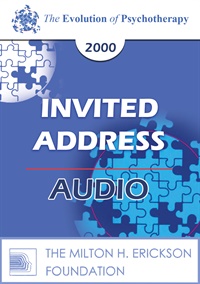
- Average Rating:
- Not yet rated
- Topic Areas:
- Suicide | Invited Addresses | Law & Ethics | Psychotherapy | Religion
- Categories:
- Evolution of Psychotherapy | Evolution of Psychotherapy 2000
- Faculty:
- Thomas Szasz, MD | James F. Masterson, MD
- Duration:
- 1 Hour 28 Minutes
- Format:
- Audio Only
- Original Program Date:
- May 25, 2000
- Short Description:
- This address is a radical inquiry into voluntary death ("death control"). Is suicide legal? Should involuntary suicide prevention be legal? Should physician-assisted suicide be legal? Personal careers, professional identities, multi-billion dollar industries, legal doctrines, judicial procedures and the liberty of every American hangs on our answers and on our justifications for them.
- Price:
- $15.00 - Base Price
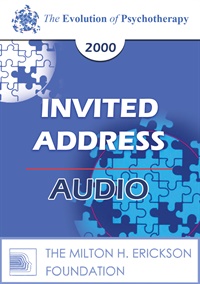
- Average Rating:
- Not yet rated
- Topic Areas:
- Children and Adolescent Therapy | Family Therapy | Invited Addresses | Abuse | Psychotherapy | Cultural and Social Contexts | Reparation | Spiritual Healing | Strategic Therapy
- Categories:
- Evolution of Psychotherapy | Evolution of Psychotherapy 2000 | Pioneers in Couples and Family Therapy
- Faculty:
- Cloe Madanes, HDL, LIC | William Glasser, MD
- Duration:
- 1 Hour 28 Minutes
- Format:
- Audio Only
- Original Program Date:
- May 26, 2000
- Short Description:
- Focuses on a family therapy approach that addresses violence and injustice through real-life interactions and systemic involvement. Emphasizes a 15-step method for healing spiritual pain, with a high success rate in treating juvenile sex offenders. Highlights the importance of engaging the whole family, including elders, to create lasting change and accountability. Introduction by Christine Padesky. William Glasser participates in conversation.
- Price:
- $15.00 - Base Price
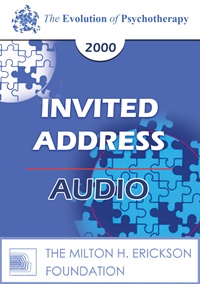
- Average Rating:
- Not yet rated
- Topic Areas:
- Invited Addresses | Psychotherapy
- Categories:
- Evolution of Psychotherapy | Evolution of Psychotherapy 2000
- Faculty:
- Michael White, B.A.S.W. | Albert Ellis, PhD
- Duration:
- 1 Hour 31 Minutes
- Format:
- Audio Only
- Original Program Date:
- May 26, 2000
- Short Description:
- All expressions of life are multi-layered, including people's descriptions of the problems they bring to therapy. An appreciation of this multi-layeredness of expression presents therapists with a multiplicity of options for therapeutic conversations. How can the multiple layers of expression be identified? How does this contribute to a range of options for re-authoring conversations?
- Price:
- $15.00 - Base Price
Tags: Psychotherapy

